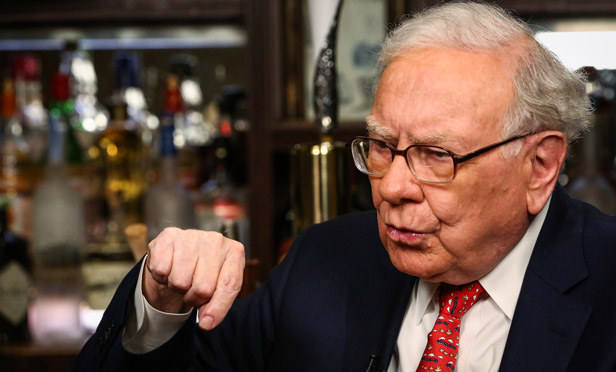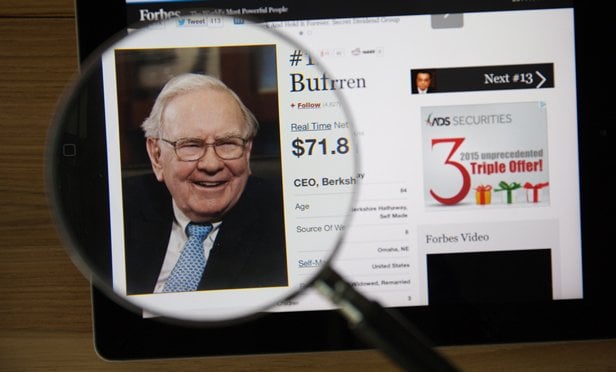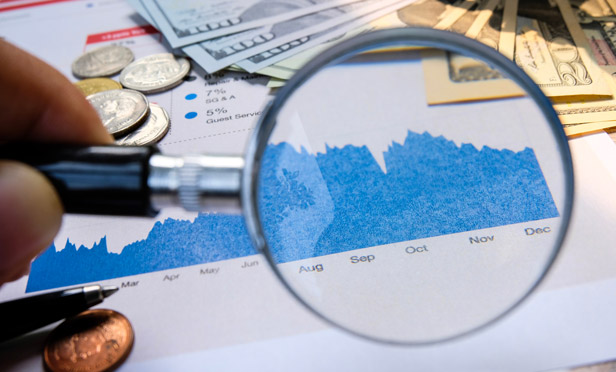Warren Buffett's 10 Nuggets of Investing Wisdom: 2019
In Berkshire Hathaway's latest shareholder letter, the Oracle of Omaha shares the strategies behind the conglomerate's success.
February 28, 2019 at 03:23 PM
2 minute read
RIAsThe original version of this story was published on Law.com
In his latest letter to investors, Berkshire Hathaway Chairman Warren Buffett highlighted the company's short-term and long-term results. He also focused on what different accounting rules mean for the firm's different performance measures and why be believes "The American Tailwind," which he credits for making Berkshire's success possible, is here to stay. "It is beyond arrogance for American businesses or individuals to boast that they have 'done it alone,'" Buffett wrote. "The tidy rows of simple white crosses at Normandy should shame those who make such claims."
Berkshire's Earnings
Since 1964, Berkshire's compound annual growth rate has averaged 20.5% in market value and 18.7% in book value vs. 9.7% for the S&P 500 (including dividends). In 2018, Berkshire shares improved 2.8% in market value and 0.4% in book value, compared with a drop of 4.4% in the S&P 500. Buffett says that the firm's $4 billion earnings in 2018 are measured by generally accepted accounting principles (or GAAP), which he has criticized. Its operating earnings were close to $25 billion. Berkshire also had a $3.0 billion noncash loss tied to its stake in Kraft Heinz, a roughly $3 billion capital gain from its sales of investment securities, and a $20.6 billion loss related to a reduction in unrealized capital gains. "A new GAAP rule requires us to include that last item in earnings. As I emphasized in the 2017 annual report, neither Berkshire's Vice Chairman, Charlie Munger, nor I believe that rule to be sensible," Buffett explained. "Rather, both of us have consistently thought … this mark-to-market change would produce what I described as 'wild and capricious swings in our bottom line.'" Given its GAAP-affected financial results, Buffet suggests that investors focus their attention on operating earnings. Check out the gallery for more insights from the latest investor letter. --- Related on ThinkAdvisor:
NOT FOR REPRINT
© 2025 ALM Global, LLC, All Rights Reserved. Request academic re-use from www.copyright.com. All other uses, submit a request to [email protected]. For more information visit Asset & Logo Licensing.
You Might Like
View AllTrending Stories
Who Got The Work
Michael G. Bongiorno, Andrew Scott Dulberg and Elizabeth E. Driscoll from Wilmer Cutler Pickering Hale and Dorr have stepped in to represent Symbotic Inc., an A.I.-enabled technology platform that focuses on increasing supply chain efficiency, and other defendants in a pending shareholder derivative lawsuit. The case, filed Oct. 2 in Massachusetts District Court by the Brown Law Firm on behalf of Stephen Austen, accuses certain officers and directors of misleading investors in regard to Symbotic's potential for margin growth by failing to disclose that the company was not equipped to timely deploy its systems or manage expenses through project delays. The case, assigned to U.S. District Judge Nathaniel M. Gorton, is 1:24-cv-12522, Austen v. Cohen et al.
Who Got The Work
Edmund Polubinski and Marie Killmond of Davis Polk & Wardwell have entered appearances for data platform software development company MongoDB and other defendants in a pending shareholder derivative lawsuit. The action, filed Oct. 7 in New York Southern District Court by the Brown Law Firm, accuses the company's directors and/or officers of falsely expressing confidence in the company’s restructuring of its sales incentive plan and downplaying the severity of decreases in its upfront commitments. The case is 1:24-cv-07594, Roy v. Ittycheria et al.
Who Got The Work
Amy O. Bruchs and Kurt F. Ellison of Michael Best & Friedrich have entered appearances for Epic Systems Corp. in a pending employment discrimination lawsuit. The suit was filed Sept. 7 in Wisconsin Western District Court by Levine Eisberner LLC and Siri & Glimstad on behalf of a project manager who claims that he was wrongfully terminated after applying for a religious exemption to the defendant's COVID-19 vaccine mandate. The case, assigned to U.S. Magistrate Judge Anita Marie Boor, is 3:24-cv-00630, Secker, Nathan v. Epic Systems Corporation.
Who Got The Work
David X. Sullivan, Thomas J. Finn and Gregory A. Hall from McCarter & English have entered appearances for Sunrun Installation Services in a pending civil rights lawsuit. The complaint was filed Sept. 4 in Connecticut District Court by attorney Robert M. Berke on behalf of former employee George Edward Steins, who was arrested and charged with employing an unregistered home improvement salesperson. The complaint alleges that had Sunrun informed the Connecticut Department of Consumer Protection that the plaintiff's employment had ended in 2017 and that he no longer held Sunrun's home improvement contractor license, he would not have been hit with charges, which were dismissed in May 2024. The case, assigned to U.S. District Judge Jeffrey A. Meyer, is 3:24-cv-01423, Steins v. Sunrun, Inc. et al.
Who Got The Work
Greenberg Traurig shareholder Joshua L. Raskin has entered an appearance for boohoo.com UK Ltd. in a pending patent infringement lawsuit. The suit, filed Sept. 3 in Texas Eastern District Court by Rozier Hardt McDonough on behalf of Alto Dynamics, asserts five patents related to an online shopping platform. The case, assigned to U.S. District Judge Rodney Gilstrap, is 2:24-cv-00719, Alto Dynamics, LLC v. boohoo.com UK Limited.
Featured Firms
Law Offices of Gary Martin Hays & Associates, P.C.
(470) 294-1674
Law Offices of Mark E. Salomone
(857) 444-6468
Smith & Hassler
(713) 739-1250



















